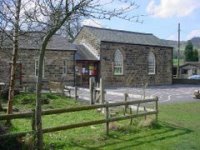Commissioner Gets a Letter
The school children have written the following letter to the Children's Commissioner:
Dear Sir Albert Aynsley-Green
As you are our Commissioner we would like you to know what is going on with our school. Our school is called Combs Infant School and is in Derbyshire. It is also the chapel and village hall in Combs. Derbyshire County Council is trying to close our school.
All our parents and grown ups in the village are doing lots to keep the school open and we want to help, which is why we are writing to you.
The school is a small Infant school with 26 children. It was put in the top 10% of all primary schools in the country after we had an outstanding Ofsted report in September 2006.
We cannot understand why it needs to be closed as we feel it is a very helpful school which helps us to understand and learn lots of exciting new things.
It is a fun and happy school with no bullying. The school has been in the village for a very long time and we would like it to be around when we are grown up. Please can you help SAVE OUR SCHOOL.
Love from all the children at Combs Infant School.
In March 2005 the Government appointed Professor Al Aynsley-Green as England's first Children's Commissioner.
.jpg) The need for a Children's Commissioner was established through the consultation that led to the Children Act 2004. The role aims to give a national voice to all children and young people, especially the disadvantaged and the vulnerable.
The need for a Children's Commissioner was established through the consultation that led to the Children Act 2004. The role aims to give a national voice to all children and young people, especially the disadvantaged and the vulnerable.Independent of government, the Commissioner's remit is to promote awareness of views and interests of children. He is expected to raise the profile of the issues that affect and concern children in England, and promote awareness and understanding of their views and interests among all sectors of society, both public and private.
This may involve working closely with organisations whose decisions affect all aspects of children's lives, including the police, schools, hospitals and voluntary groups.
.jpg)

No comments:
Post a Comment